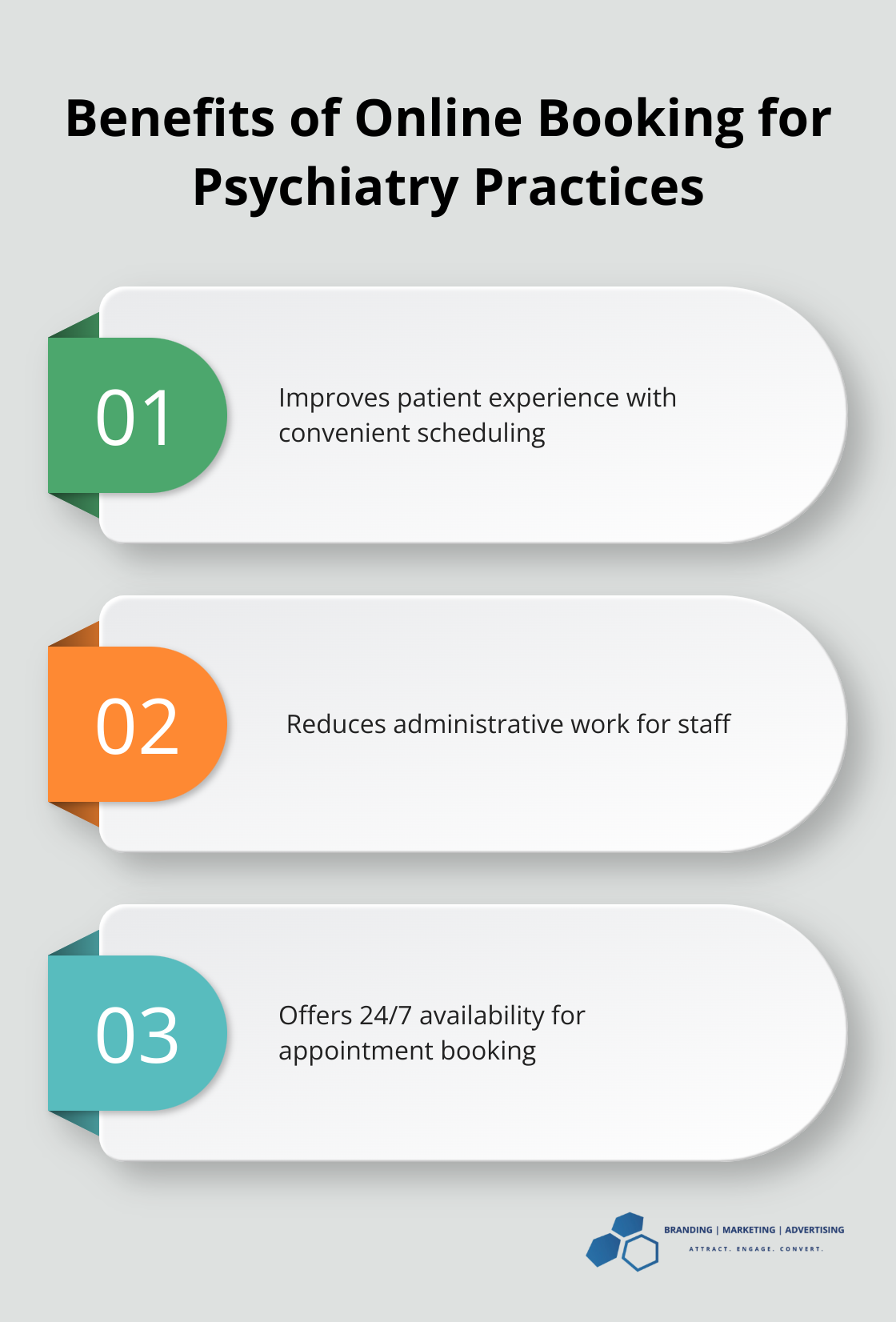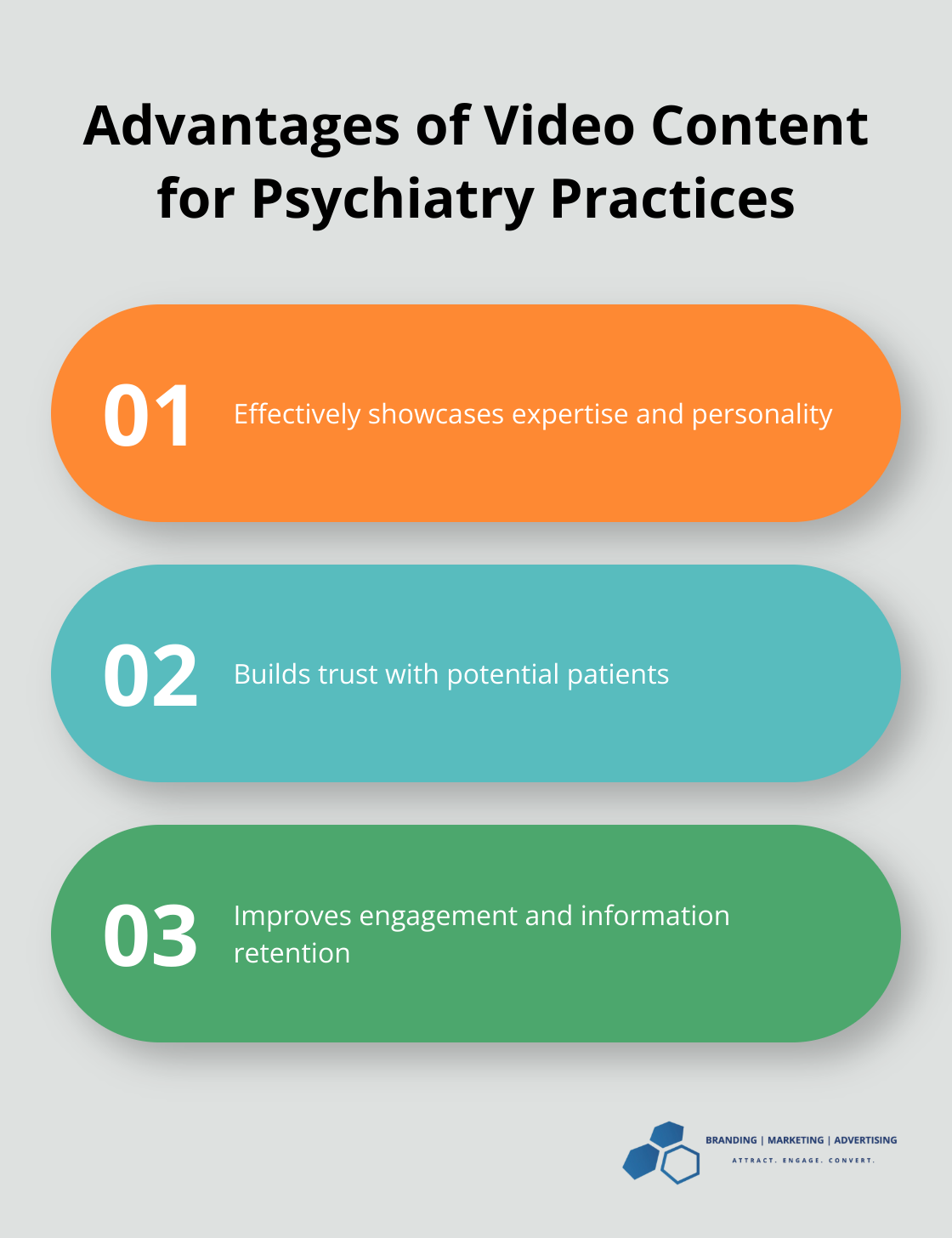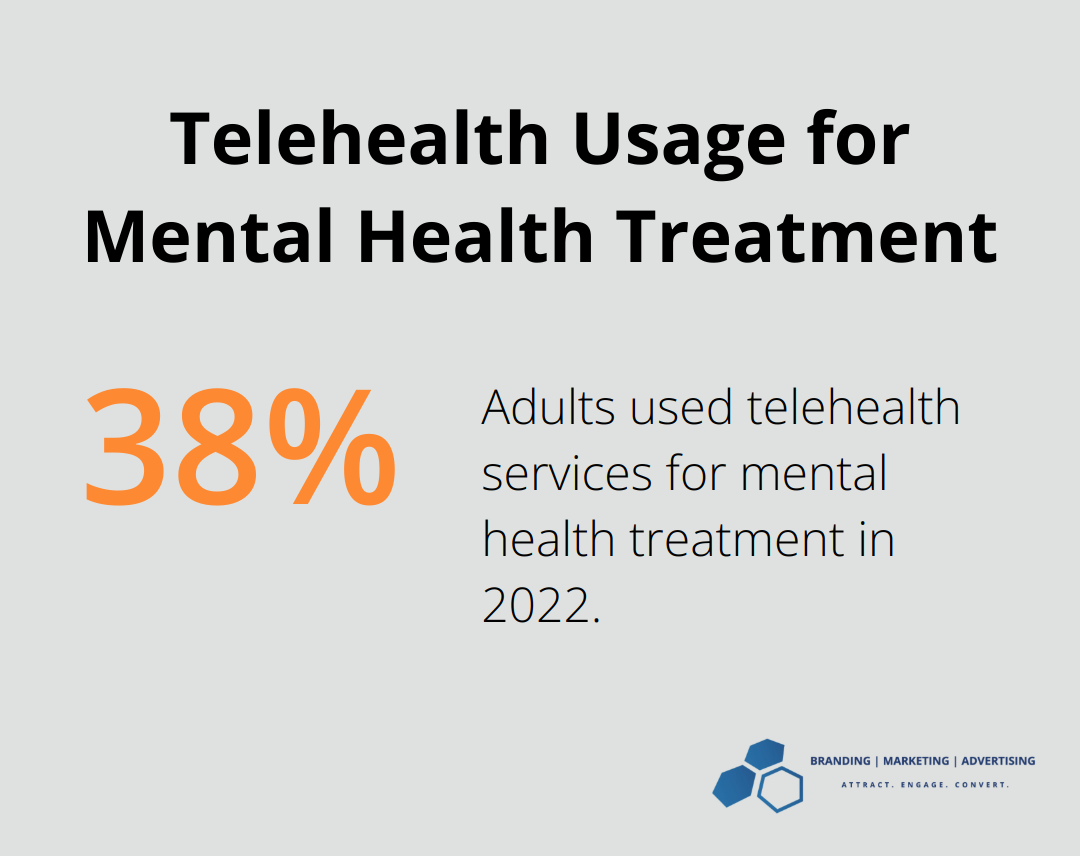Innovative Marketing Tactics for Psychiatry Practices [2025]
At Branding | Marketing | Advertising, we’ve seen psychiatry marketing evolve rapidly in recent years. The digital landscape has opened up new opportunities for mental health professionals to connect with patients and build their practices.
In this post, we’ll explore innovative tactics that psychiatrists can use to enhance their online presence and attract more clients in 2025. From leveraging social media to implementing personalized engagement strategies, these approaches will help your practice thrive in the competitive healthcare market.
How Digital Platforms Boost Mental Health Outreach
Digital platforms form the foundation of effective psychiatry marketing in 2025. These tools transform mental health outreach and connect practitioners with patients in innovative ways. Let’s explore practical strategies to leverage digital platforms for your practice.
Master Social Media for Mental Health
Social media platforms like Instagram and Facebook offer powerful tools to connect with potential patients. Share concise mental health tips, infographics about common disorders, and glimpses into your practice. Create a weekly “Mindful Monday” post featuring a quick meditation exercise. This approach provides value and showcases your expertise.
Engage with your followers actively. Respond to comments and messages quickly. This engagement builds trust and demonstrates your attentiveness and care.
Create a Patient-Centric Website
Your website often serves as the first point of contact for potential patients. Ensure it’s user-friendly and packed with valuable resources. Include a FAQ section addressing common therapy concerns, a blog with in-depth mental health articles, and clear information about your services and approach.
Add a secure online booking system to your site. Digital appointment scheduling is one of the key demands of patients in 2025. This feature improves patient experience and reduces administrative work for your staff.

Target Advertising for Mental Health Services
Online advertising proves highly effective when executed properly. Use platforms like Google Ads to target keywords related to specific mental health issues you specialize in. For instance, if you focus on anxiety disorders, target phrases like “anxiety treatment in [your city]” or “how to manage panic attacks.”
Facebook’s detailed targeting options allow you to reach potential patients based on interests and behaviors related to mental health and wellness. You can even create lookalike audiences based on your current patient base to find similar individuals who might benefit from your services.
Blog for Patient Education and SEO
A well-maintained blog serves two important purposes: it educates potential patients and boosts your search engine rankings. Focus on topics that address common patient concerns and questions. Write about “5 Signs You Might Benefit from Therapy” or “Understanding the Difference Between Anxiety and Depression.”
Use keyword research tools to identify what your potential patients search for online. Incorporate these keywords naturally into your blog posts to improve your visibility in search results.
Implement these strategies to create a robust digital presence that attracts and engages potential patients. Consistency plays a key role in digital marketing. Update your content regularly and engage with your audience to build lasting relationships and grow your practice.
As we move forward, let’s explore how content marketing builds trust and credibility for your psychiatry practice.
How to Build Trust Through Content Marketing
Content marketing serves as a powerful tool for psychiatry practices to establish credibility and connect with potential patients. We’ve observed how effective content can transform a practice’s online presence and patient acquisition.
Create Engaging Video Content
Video content showcases your expertise and personality effectively. Produce short, informative videos on common mental health topics. For example, create a 2-minute video explaining the basics of cognitive behavioral therapy or discussing the signs of depression. Video is an essential element of a successful healthcare marketing strategy.
Use platforms like YouTube or TikTok to share your content. Keep videos concise and focused on a single topic. Include captions for accessibility and to capture viewers who watch without sound. Optimize your video titles and descriptions with relevant keywords to improve discoverability.

Host Interactive Online Events
Webinars and virtual Q&A sessions provide valuable opportunities to engage with potential patients and demonstrate your expertise. Select topics that address common concerns or misconceptions about mental health. For instance, host a webinar on “Managing Anxiety in Uncertain Times” or “Understanding the Link Between Diet and Mental Health.”
Use platforms like Zoom or Google Meet to host these events. Promote them through your social media channels and email list. Encourage attendees to submit questions in advance to ensure you address their most pressing concerns.
Leverage Expert Collaborations
Collaborations with influencers and thought leaders in the mental health field can significantly expand your reach and credibility. Identify respected professionals in complementary fields (such as nutritionists, sleep specialists, or mindfulness coaches). Invite them to co-create content or participate in joint webinars.
For example, partner with a well-known nutritionist to create a series on the connection between gut health and mental well-being. Or collaborate with a meditation expert to offer a free guided meditation session for stress relief. These collaborations not only provide valuable content for your audience but also expose your practice to new potential patients.
Share Authentic Patient Stories
Patient success stories build trust and illustrate the effectiveness of your approach. Always obtain explicit consent before sharing any patient information. Focus on the journey and outcomes rather than specific diagnoses or treatments.
For instance, share a story about how a patient overcame social anxiety and advanced in their career. Or highlight how therapy helped a couple improve their communication and strengthen their relationship. These stories humanize your practice and provide relatable examples of how therapy can positively impact lives.
When you craft your content marketing strategy, prioritize providing value to your audience. Address their concerns, answer common questions, and offer practical tips they can implement in their daily lives. Consistent delivery of high-quality, informative content will establish your practice as a trusted resource in the mental health field.
Measure the impact of your content marketing efforts. Use analytics tools to track engagement, website traffic, and lead generation from your various content initiatives. This data will help you refine your strategy and focus on the most effective types of content for your audience.
As we transition to the next section, let’s explore how personalized patient engagement strategies can complement your content marketing efforts and further enhance your practice’s growth.
How to Personalize Patient Engagement for Psychiatry Practices
Personalized patient engagement transforms psychiatry practices in the digital age. We at Branding | Marketing | Advertising have observed significant improvements in patient satisfaction and retention rates through tailored strategies.
Secure Patient Portals Enhance Communication
A secure patient portal revolutionizes psychiatry practices. These platforms enable patients to access health information, schedule appointments, and communicate with healthcare providers securely. A recent study aimed to explore patient and caregiver experiences, facilitators, and barriers to accessing and using a patient portal called MyChart.
When you choose a patient portal, prioritize user-friendliness and robust security features. Ensure HIPAA compliance to protect patient privacy. Train your staff thoroughly on portal usage to assist patients with questions or concerns.
Virtual Consultations Expand Access to Care
Teletherapy popularity has surged, with the American Psychiatric Association reporting 38% of adults used telehealth services for mental health treatment in 2022. Virtual consultations expand your practice’s reach and provide flexibility for patients who struggle with in-person sessions.

To implement effective teletherapy, invest in a reliable, HIPAA-compliant video conferencing platform. Provide clear instructions to patients on platform access and use. Consider offering a brief tech check before the first session to ensure a smooth experience.
Mobile Apps Streamline Patient Experience
A mobile app for your practice streamlines appointment scheduling, sends reminders, and provides easy access to resources. Accenture found that 75% of patients believe mobile apps improve their healthcare experience.
Focus on key features that add value when designing your app. Include a secure messaging system, appointment scheduling functionality, and access to educational resources. Update the app regularly based on patient feedback to meet their needs effectively.
Personalized Email Campaigns for Patient Follow-ups
Email campaigns offer a powerful tool for personalized patient follow-ups. Create targeted email sequences for different patient groups (e.g., new patients, long-term patients, patients with specific conditions). These emails can include appointment reminders, educational content, and personalized treatment tips.
Try to segment your email list based on patient characteristics and preferences. This approach allows you to send highly relevant content to each patient group. Monitor open rates and engagement to refine your email strategy over time.
Personalized patient engagement strategies prove essential for modern psychiatry practices. Implement secure communication channels, offer flexible consultation options, and leverage mobile technology to enhance patient satisfaction and improve treatment outcomes. The goal: make mental health care more accessible and tailored to each patient’s needs.
To effectively implement these strategies and grow your practice, consider partnering with digital marketing experts who can help you attract and engage your ideal audience.
Final Thoughts
Innovative marketing tactics reshape psychiatry practices in 2025. Digital platforms enable mental health professionals to connect with patients meaningfully. Content marketing builds trust and credibility through educational videos, webinars, and authentic patient stories.
Personalized patient engagement transforms psychiatry practices. Secure portals, virtual consultations, and mobile apps improve access to care. Tailored email campaigns keep patients informed throughout their treatment journey.
Psychiatry marketing adapts to digital trends for growth and success. Branding | Marketing | Advertising specializes in helping healthcare practices thrive in the digital landscape. Our team can develop effective strategies tailored to your practice’s unique needs.












